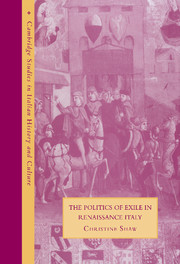1 - Into exile
Published online by Cambridge University Press: 31 July 2009
Summary
Italy was not the only region of Western Europe in which there were political exiles in the later fifteenth century. When Henry VI fled to Scotland after the defeat of his supporters at the battle of Towton in March 1461, he was not unusual among the English kings of the fifteenth century in having personal experience of exile. ‘His grandfather [Henry IV] had won the kingdom from exile; Henry's successor [Edward IV] was to recover it from exile. Starting out from exile … his nephew, Henry Tudor, was likewise to secure a kingdom for himself in 1485.’ The future Louis XI of France took refuge at the court of the Duke of Burgundy in 1456, and he did not return to France until he came to take possession of the French throne in 1461 after his father's death. But if the highest in the land knew exile in England and France, as some members of Italian ruling families did, there do not seem to have been the equivalents there of the exiles from civic strife that were so common in Italy. Towns in England, France and Spain, even the great cities of the Low Countries, did not have the degree or type of political independence that gave rise to the kind of contest for power that resulted in the exile of political opponents. The Imperial cities of the Holy Roman Empire had greater autonomy and powers of self-government.
- Type
- Chapter
- Information
- The Politics of Exile in Renaissance Italy , pp. 5 - 54Publisher: Cambridge University PressPrint publication year: 2000



